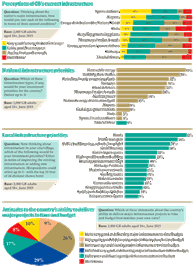The prospect of additional costs for the rail industry arose through the promise of “action to ensure that rail passengers have access to compensation when trains are more than a few minutes late”.
As for wider objectives, there is no sense either in the terms of reference for the NIC or in the Autumn Statement of a guiding mind, of any policy or vision underpinning spending, other than a drive for economic growth.
Climate change
Unlike Labour’s plans for the NIC, there is no mention of the environment or climate change. To plan new infrastructure without even recognising the economic and physical necessity for modal change and setting appropriate targets seems breathtakingly irresponsible.
Transport infrastructure development needs to be matched by a framework of complementary pricing policies to move towards genuinely sustainable outcomes.
Osborne described the NIC as “a statement from our generation that says: ‘we are going to think for the long term, we are going to plan for the future, we are going to lead the world’”.
Ignoring the fanciful hyperbole, the only way to plan for the future is to have a clear vision of how Britain needs to develop and what transport will look like 30 years hence.
As the architect Norman Foster says, infrastructure is about “investing not to solve the problems of today but to anticipate the issues of future generations”. If, as scientists warn and the UN sustainable development goals set out, the global economy needs to be decarbonised by 2050 to avoid unimaginable disruption and costs before the end of the century, infrastructure investment plans that take no account of this are not fit for purpose.
As the costs and lifestyle-disrupting aspects of climate change become more apparent by the year, it should be unthinkable for policies in all spheres of the public realm not to be subordinated to the goal of decarbonisation and maintenance of a stable biosphere. Unless the NIC is given a framework with clear societal as well as economic objectives, it may be counter-productive in its impact.
Economic growth and sustainability are not mutually exclusive. Britain still needs to build a consensus around a strategy for that long-lost Holy Grail - a rigorously integrated transport policy.
Read the peer reviews for this feature.
Download the graphs for this feature.












